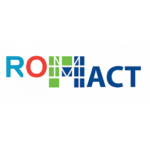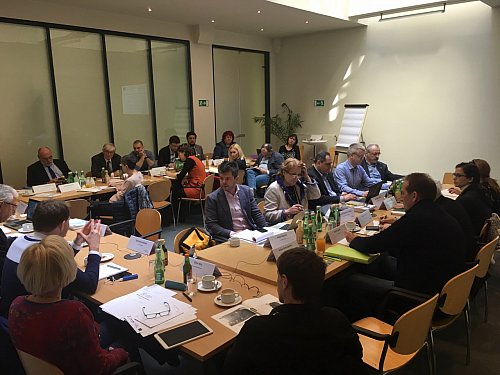SHAPING OUR FUTURE TOGETHER – THE 6TH MEETING OF THE DANUBE LOCAL ACTORS PLATFORM
On 21 March 2017, the coordination of Priority Area 10 (City of Vienna) welcomed around 30 participants at the 6th meeting of the Danube Local Actors Platform (D-LAP) in Vienna. The meeting aimed at facilitating the exchange on activities and initiatives, exploring possibilities for cooperation and providing input for the organisation of the 4th Danube Participation Day in Budapest in October 2017.
4th Danube Participation Day – drafting the agenda
The Danube Participation Day will be organised for the 4th time in a row by Priority Area 10 in cooperation with the Danube Civil Society Forum and the Baden Württemberg Foundation. This year, the event “Bottom Up and Top Down: Science meets Innovation and Participation” will be hosted by the Andrassy University in Budapest. Ellen Bos, Prorector of the Andrassy University in Budapest, presented a first draft agenda of the upcoming Danube Participation Day on 17 October 2017. A special emphasis will be put on the scientific perspective of participation in public governance, the role of local administration, civil society and academia for transformation processes and social innovation as well as the opportunities for civil society to take part in the dialogue on cohesion policy post 2020 and to shape future regional development. The members of the D-LAP have the opportunity to submit proposals for speakers as well as projects or initiatives to present at the event to PAC 10 (City of Vienna).
What happens in your region?
The Danube Local Actors Platform aims at facilitating joint cooperation between civil society, public administration and academia in order to strengthen participation in public decision-making and policy implementation. Milan Andrejkovic, Plenipotentiary of the Government of Slovakia for Civil Society and host of last year’s Danube Participation Day, talked about his experiences with organising the event. One of the big challenges for the participation is that civil society and public administration speak “different languages”. Thus, the plenipotentiary’s office works on “translating” in order to enable the dialogue between public and private stakeholders.
Peter Langer from the Council of Danube Cities and Regions (CoDCR) talked about the last meeting of CoDCR members that took place in the course of the 3rd Danube Participation Day in Bratislava. The Danube cities and regions discussed together with representatives from civil society and academia how to establish participative governance and how to foster cooperation between cities, regions and civil society towards sustainable development in the macro-region in order to establish social stability and economic growth. The next meeting of the CoDCR will take place in Ulm on the 26 and 27 April 2017.
The coordination of Priority Area 10 in cooperation with the Danube Civil Society Forum (DCSF) encourages stakeholders in the Danube Region to organise national Participation Days in order to establish national or regional platforms for exchange and cooperation between public and private actors. Stefan Lütgenau, President of the DCSF, informed on the planned national Participation Days for 2017. The development turns out to be encouraging in regard to the target of Priority Area 10 to establish national hearings or participation days in at least 80% of Danube countries. After national events in Budapest and Novi Sad in March, national participation days are planned in Sofia, Bratislava, Prague, Chisinau, Odessa, Eisenstadt, Ljubljana and in Baden Württemberg.
The up-coming national Participation Days will be announced on the PA 10 website.
The Hungarian meeting with national representatives of civil society was the kick-off for the Civil Day that is expected to take place in Budapest in September. The conference will be organised by European House. Miklos Barabas, Director of European House, informed that the conference will deal with civil society in the four macro-regions. Further details of the event will be announced at a later stage.
Jani Kozina, researcher at the Anton Melik Geographical Institute in Ljubljana, presented the project “AgriGo4Cities” that was recently approved by the Danube Transnational Programme (DTP). The project aims at empowering vulnerable groups. More specifically, the transnational project partnership seek to enhance participation in urban planning processes through urban farming.
Executive Director Centre for Regional Studies, Igor Studenikov, reported on the Ukrainian activities. In December 2016, the Centre for Regional Studies organised an event in cooperation with the Ministry for Regional Development and Foreign Affairs in Kiev that focused on civil society involvement in public governance. He welcomed the cooperation with the DCSF and highlighted the importance of bringing the EU Strategy for the Danube Region to the political agenda in Ukraine.
Photo credit: V. Gödölleová/DCSF




